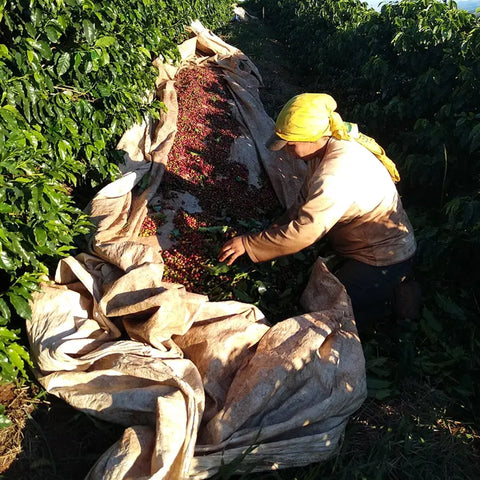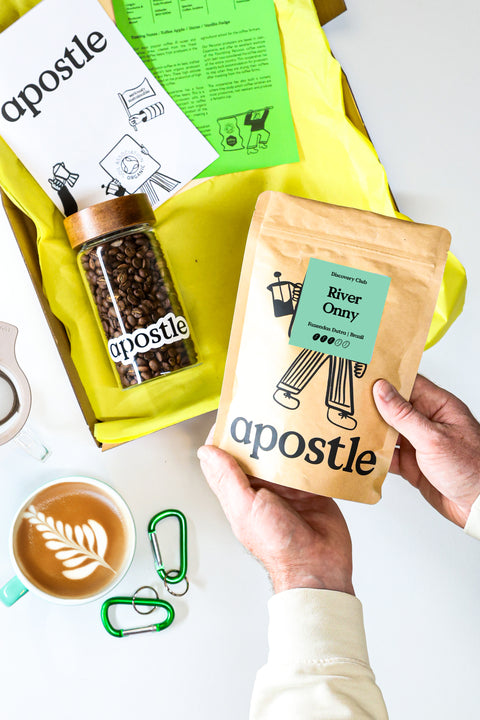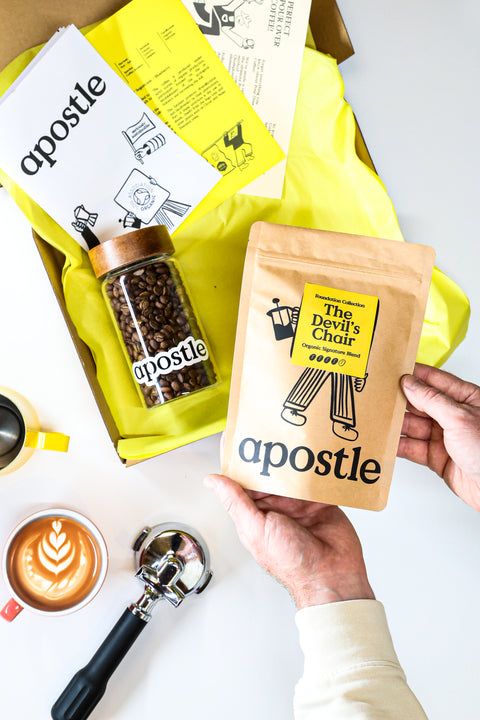Organic vs Non-Organic Coffee: What’s the Difference?
As one of the most traded commodities in the world, the way coffee is farmed, processed, and roasted has a huge impact — not just on taste, but on the people who grow it and the wider environment.
So, when choosing coffee, should we be going for organic or non-organic? At Apostle Coffee we’ve championed organic producers since the very beginning, but there are other important factors to consider too. It’s far too easy to fall into an “either/or” mindset, when in reality both approaches have merits and challenges.
First, let’s get a clearer understanding of the differences between organic and non-organic coffee — and then explore an appealing middle ground between the two.
What Is Organic Coffee?
Organic coffee is grown without synthetic pesticides, herbicides, or fertilisers. Certification standards differ from country to country, but they follow the same principles: soil health management, biodiversity protection, and traceability throughout the supply chain. Farmers often rely on natural fertilisers like compost or manure, and pest control methods that minimise chemical inputs.
At Apostle, we work with the Soil Association to certify our organic status. This involves detailed tracking of where the coffee comes from — ensuring that the origin is accredited at source — as well as how it has been transported, stored, and roasted.
Why Choose Organic Coffee?
From a consumer perspective, the interest in organic coffee often comes down to health. Why put chemicals on your food when there’s an option that minimises exposure? Beyond this, organic farming supports biodiversity, protects ecosystems, and creates healthier working conditions for farmers who avoid prolonged exposure to agrochemicals.
It’s worth noting, though, that even if non-organic coffee has been treated with chemicals during farming, the beans go through a long processing stage. The coffee cherry’s flesh is removed, the beans are washed, dried, and stored — meaning much of what was used to support crop health is unlikely to end up in your final cup.
The Case for Non-Organic Coffee
Non-organic coffee is the global norm. Conventional farming techniques can include chemical fertilisers and pesticides to improve yields and protect plants from pests and disease.
For many smallholder farmers working with razor-thin margins, these inputs can be the difference between surviving or losing an entire harvest. In this way, pesticides and fertilisers can provide a lifeline, ensuring greater certainty over both yield and quality.
With global demand for coffee continuing to grow, conventional methods also help meet this demand. They reduce risks from pests and disease, improve consistency, and keep prices more accessible to consumers.
That said, not all non-organic farms are chemical-intensive. Coffee farming is often small-scale, taking place in subtropical mountain regions where farmers manage their land carefully. Many join cooperatives to improve processing and pricing power. These communities frequently use sustainable practices aligned with organic principles — even if they don’t pursue certification, which can be expensive.
Agroforestry: An Appealing Middle Ground
As global appetite for sustainable farming grows, agroforestry has emerged as a powerful alternative. This traditional practice integrates trees and shrubs into farming systems. In coffee, this means growing alongside shade trees, fruit, naturally pest-resistant plants, and sometimes even livestock.
At its heart, agroforestry improves soil health, provides shelter for crops, sequesters carbon, and diversifies income streams. Farmers can harvest additional crops like fruit and timber while still focusing on coffee.
Benefits of Agroforestry in Coffee
-
Biodiversity: Trees create habitats for birds, insects, and other wildlife.
-
Soil Health: Organic matter from trees and cover crops replenishes nutrients naturally.
-
Climate Resilience: Shade protects coffee plants from extreme heat, rainfall, and erosion.
-
Carbon Capture: Well-managed agroforestry systems can sequester significant amounts of carbon.
The beauty of agroforestry is that it doesn’t require organic certification to deliver impact. Its benefits stretch far beyond the coffee crop itself, showing that even conventional farms can embrace sustainable practices.
Making the Right Choice…
So, is organic coffee better than non-organic? Not necessarily. The environmental benefits of organic practices are clear, but the reality is more nuanced.
Many non-organic farmers are actively reducing chemical use, protecting habitats, and maintaining ecosystems, all while providing consistent crops to support their families and communities. Likewise, not all organic coffee is automatically “better” — standards vary by country, and some chemical inputs are still permitted if approved by accreditation bodies.
As a coffee drinker, the key is transparency. Choose roasters and producers who are open about their sourcing, their farming partnerships, and their commitment to sustainability. Align your choices with the values that matter most to you, and your coffee will taste all the sweeter.
Thanks for reading — and happy brewing!










